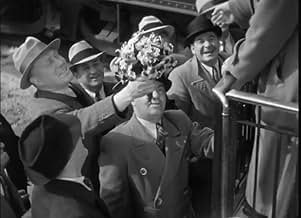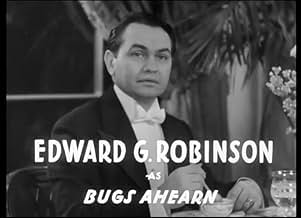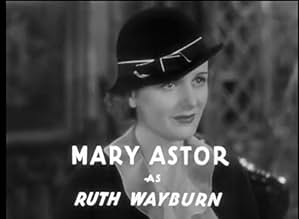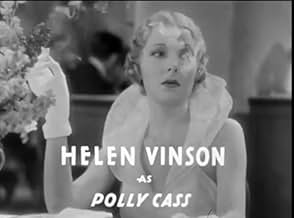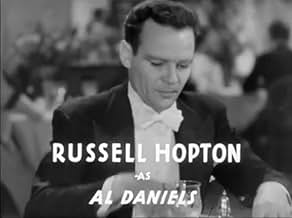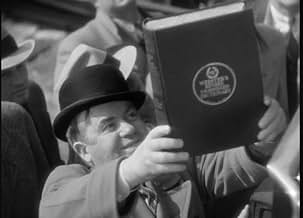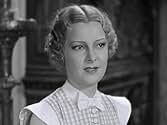NOTE IMDb
7,0/10
1,5 k
MA NOTE
Ajouter une intrigue dans votre langueWhen Prohibition ends, a beer baron sees the writing on the wall, quits the rackets, and tries to break into California society.When Prohibition ends, a beer baron sees the writing on the wall, quits the rackets, and tries to break into California society.When Prohibition ends, a beer baron sees the writing on the wall, quits the rackets, and tries to break into California society.
- Réalisation
- Scénario
- Casting principal
- Récompenses
- 2 victoires au total
Don Dillaway
- Gordon Cass
- (as Donald Dillaway)
Loretta Andrews
- Society Girl
- (non crédité)
Bonnie Bannon
- Society Girl
- (non crédité)
Joan Barclay
- Society Girl
- (non crédité)
Max Barwyn
- Headwaiter
- (non crédité)
Sidney Bracey
- Butler
- (non crédité)
Harry C. Bradley
- Harry S. Winter
- (non crédité)
Lynn Browning
- Society Girl
- (non crédité)
Joe Caits
- One of Bugs' Mugs
- (non crédité)
Maxine Cantway
- Society Girl
- (non crédité)
Avis à la une
Prohibition ends and gangster boss Bugsy Ahearn, like so many during the depression, finds himself unemployed. What to do? Fortunately, he has laid aside much of his ill-gotten gains and has no money worries. So he decides to improve himself, to acquire some culture and move in elite circles. And therein lies a very funny story.
Edward G. Robinson shows a flair for comedy and shows off some of his immense talent as a social climber who decides to shoot the moon. He moves from Chicago to the West Coast, buys a mansion and falls for a lady from a family of swindlers, and generally falls into a series of mishaps, each one funnier than the last. He gets excellent support from Mary Astor, who becomes his guide to the finer points of becoming 'quality'.
You will gain great respect for Robinson if you've only seen him in tough-guy roles, as he carries the picture as a society naif in this written-for-the-screen comedy. There are no dead spots, either, as the story moves along briskly in an enjoyable 75 minutes. It was shown at Cinefest, Columbus, O., 6/13.
Edward G. Robinson shows a flair for comedy and shows off some of his immense talent as a social climber who decides to shoot the moon. He moves from Chicago to the West Coast, buys a mansion and falls for a lady from a family of swindlers, and generally falls into a series of mishaps, each one funnier than the last. He gets excellent support from Mary Astor, who becomes his guide to the finer points of becoming 'quality'.
You will gain great respect for Robinson if you've only seen him in tough-guy roles, as he carries the picture as a society naif in this written-for-the-screen comedy. There are no dead spots, either, as the story moves along briskly in an enjoyable 75 minutes. It was shown at Cinefest, Columbus, O., 6/13.
The Little Giant is so adorable, and so entertaining, I accidentally watched it twice without recognizing it until halfway through! I love Edward G. Robinson, so it was no hardship to sit through one of his classically touching films about a gangster who wants to go straight and find class in high society. If you loved him in Brother Orchid, check out The Little Giant.
When Eddie G and his faithful sidekick Russell Hopton go to Santa Barbara after their bootlegging days are over, they're snubbed by high society. Only after his wealth becomes apparent does Eddie G get noticed, and unfortunately by the wrong woman: Helen Vinson. She's a gold-digger and seduces Eddie G while the rest of her family tries to swindle him out of money. This sounds depressing, but like I said, if you liked Brother Orchid, watch this movie. It's cuter and more heart-warming than it sounds. There are tons of jokes as he tries to come across as high class, like calling Plato 'Pluto' and asking what state California is in. Plus, it's always sweet to see Eddie G in a romance, and this time around he gets to fall in love with both Helen and Mary Astor!
When Eddie G and his faithful sidekick Russell Hopton go to Santa Barbara after their bootlegging days are over, they're snubbed by high society. Only after his wealth becomes apparent does Eddie G get noticed, and unfortunately by the wrong woman: Helen Vinson. She's a gold-digger and seduces Eddie G while the rest of her family tries to swindle him out of money. This sounds depressing, but like I said, if you liked Brother Orchid, watch this movie. It's cuter and more heart-warming than it sounds. There are tons of jokes as he tries to come across as high class, like calling Plato 'Pluto' and asking what state California is in. Plus, it's always sweet to see Eddie G in a romance, and this time around he gets to fall in love with both Helen and Mary Astor!
How can one not love a great Edward G. Robinson flick? Here he plays a Chicago gangster named 'Bugs' looking to go straight, with a seemingly unhealthy obsession with mingling with "high society" people.
Of course he gets out to California with his buddy, and while keeping his old gangster life a secret, gets involved with a woman who, along with her family, wants to swindle him out of his money. Like a fish out of water, Bugs is out of his element and can't see the scam against him, so blinded by the pretty woman.
The real hilarious thing about "The Little Giant" is that after Bugs realizes he's been scammed, the gangsters then turn into the good guys to make things right. This being a comedy, we laugh as the gangsters even use torture (!) to set things straight, all while cracking jokes. Bugs even refers to the ones who swindled him as (insert gay slur here). Talk about pre-code!
As always, Edward G. Is non-stop, and the film is a tour-de-force for him to showcase his quick wit and razor-sharp delivery. Definitely worth a viewing.
Of course he gets out to California with his buddy, and while keeping his old gangster life a secret, gets involved with a woman who, along with her family, wants to swindle him out of his money. Like a fish out of water, Bugs is out of his element and can't see the scam against him, so blinded by the pretty woman.
The real hilarious thing about "The Little Giant" is that after Bugs realizes he's been scammed, the gangsters then turn into the good guys to make things right. This being a comedy, we laugh as the gangsters even use torture (!) to set things straight, all while cracking jokes. Bugs even refers to the ones who swindled him as (insert gay slur here). Talk about pre-code!
As always, Edward G. Is non-stop, and the film is a tour-de-force for him to showcase his quick wit and razor-sharp delivery. Definitely worth a viewing.
Like every great First National picture, this one starts off quickly, with Edward G. Robinson in full, glorious gangster mode, speaking the classic language of the Prohibition movie gangsters, words like "mugs" and "rods" ornamenting his lines. But there is a twist here: Robinson (as "Bugs" Ahearn, the "Beer Baron"), is going to quit the illegal beer business (since Prohibition has ended), and go straight. In fact, Bugs has a dream: to become successful in high society.
The script is very fast paced and delightful, and in a couple of places, quite shocking, reminding us of how progressive pre-Code Hollywood could be; I almost fell out of my chair when Robinson's flunky and companion Al, when asked by Robinson whether he ever saw a painting like the one in his living room, responds with, "not since I stopped using cocaine"!! Another shocker comes later when Robinson refers to some slimy society people as "fags". Oh dear!
Robinson was an amazing actor. He constantly shifts back and forth between the know-it-all wiseguy bully, and a would be high society snob, who is very unsure of himself. This uncertain, unconfident Robinson, a tough guy who swallows his pride and grovels before his betters, is pleasing to see, and he does it very well. Perhaps one of the great Robinson scenes of all time is when Mary Astor seduces an unsuspecting EGR on a couch. Robinson plays it beautifully, as he has no idea that he is being seduced; and in a delightful moment, when Mary Astor has shyly moved away, sudden realization hits EGR as to what might have just happened. He turns to the camera, and I swear he makes exactly the kind of faces, registering surprise and possible comprehension to the audience, exactly as Oliver Hardy famously did a thousand times in his career. A priceless and lovely moment.
There are many satisfying moments in this film, and I highly recommend this. The early EG Robinson movies are gifts to be treasured, and this is one of the best.
The script is very fast paced and delightful, and in a couple of places, quite shocking, reminding us of how progressive pre-Code Hollywood could be; I almost fell out of my chair when Robinson's flunky and companion Al, when asked by Robinson whether he ever saw a painting like the one in his living room, responds with, "not since I stopped using cocaine"!! Another shocker comes later when Robinson refers to some slimy society people as "fags". Oh dear!
Robinson was an amazing actor. He constantly shifts back and forth between the know-it-all wiseguy bully, and a would be high society snob, who is very unsure of himself. This uncertain, unconfident Robinson, a tough guy who swallows his pride and grovels before his betters, is pleasing to see, and he does it very well. Perhaps one of the great Robinson scenes of all time is when Mary Astor seduces an unsuspecting EGR on a couch. Robinson plays it beautifully, as he has no idea that he is being seduced; and in a delightful moment, when Mary Astor has shyly moved away, sudden realization hits EGR as to what might have just happened. He turns to the camera, and I swear he makes exactly the kind of faces, registering surprise and possible comprehension to the audience, exactly as Oliver Hardy famously did a thousand times in his career. A priceless and lovely moment.
There are many satisfying moments in this film, and I highly recommend this. The early EG Robinson movies are gifts to be treasured, and this is one of the best.
Although the early sound era presented some problems - such as stationary camera shots with the actors nailed to their marks, and minimal use of background music resulting in long stretches of torpor - by 1931 most of these bugs had been corrected; thus the pre-censorship period of '31-'34 is chockfull of some of the most vigorous, creative and satisfying movies of Hollywood's Golden Age, however little-known many of them may be. LITTLE GIANT is one such hidden gem. A lightning-paced gangster comedy from the Warner-First National studio (where speed and economy were stylistic hallmarks), it's fast, funny and flippant in a manner that the decayed virgins of the Hays Office would render, if not impossible, at least awfully difficult after '34. Edward G Robinson plays Bugs Ahearn, a Chicago bootlegger put out of business by Prohibition's repeal, who decides to relocate to California and buy his way into society. Once there, he's immediately preyed upon by the type of 'respectable' vipers & parasites his background has left him ill-equipped to recognize, let alone fend off. This 'fish-out-of-water' comedy benefits greatly from a cheerfully amoral tone and a slew of zesty performances, not least of them Mary Astor's as a busted heiress who is the only non-hood here who's on the level. The mix of slapstick and rat-a-tat verbal comedy, coming at you at fast as it does, works very well, and nobody was better at this kind of hectic farce than the woefully-underrated Roy del Ruth, who was one of a number of sure & steady craftsmen who hit their peaks only under the Warners' aegis. In Del Ruth's case, the coming of the Code (and his subsequent move to MGM) proved to be disastrous: though he continued to direct till the late 50s, his post-Warners work was so drained of zest and inspiration that he is hardly remembered at all today. Even the auteurist crowd dismisses him as a competent hack. But do yourself a favor and seek out everything he did prior to 1935, and you'll be rewarded with a body of work that will surprise you with its cynical bite and confident staging. They play as well today as they did the day they opened. (Highly recommended, besides GIANT, are BLESSED EVENT, LADY KILLER, EMPLOYEES ENTRANCE & TAXI.)
Le saviez-vous
- Anecdotes"Al" recounts a job where he shot up a stuffed Polar Bear. The same plot scene was depicted in L'ennemi public (1931) with "Tom" doing the shooting.
- GaffesThe image of the single-engine plane carrying Ahern's "boys" appears empty except for the pilot.
- Citations
James Francis 'Bugs': The toughest mug in Chicago comes out here and gets trimmed by a lot of fags with handkerchiefs up their sleeves.
- ConnexionsFeatured in Public Enemies: The Golden Age of the Gangster Film (2008)
- Bandes originalesChicago (That Toddlin' Town)
(1922) (uncredited)
Written by Fred Fisher
Played during the opening credits
Reprised when the gang comes to Santa Barbara
Reprised at the end
Meilleurs choix
Connectez-vous pour évaluer et suivre la liste de favoris afin de recevoir des recommandations personnalisées
Détails
- Date de sortie
- Pays d’origine
- Langues
- Aussi connu sous le nom de
- The Little Giant
- Lieux de tournage
- Hotel Del Monte, Monterey, Californie, États-Unis(Polo field location)
- Société de production
- Voir plus de crédits d'entreprise sur IMDbPro
Box-office
- Budget
- 197 000 $US (estimé)
- Durée
- 1h 16min(76 min)
- Couleur
- Mixage
- Rapport de forme
- 1.37 : 1
Contribuer à cette page
Suggérer une modification ou ajouter du contenu manquant

